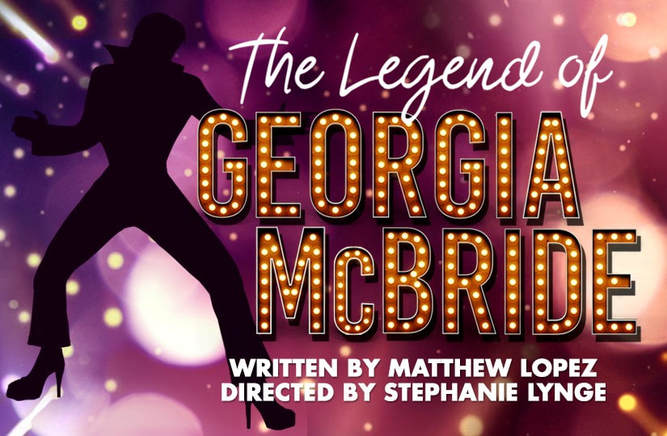
The Legend of Georgia Mcbride features an Elvis impersonator and drag queens. What’s not to love? Matthew Lopez has penned a predictable conventional fish-out-of-water story—what with the straight Elvis impersonator, whose Elvis bit isn’t impressing the Southern Florida crowd—resorting to learning the ropes of drag performance to keep his job and provide for his family. Yet the stellar cast and solid direction by Stephanie Lynge elevates the play to a hilarious musical romp in which we do find reasons to care about the plight of the characters.
Mark Chambers as the matronly Miss Tracy Mills gets all the best lines as she helps Casey discover his hidden inner woman, Georgia McBride. In one great scene during a tense moment where Casey confesses to his wife, Jo, that he’s doing drag, Chambers-as- Miss Tracy removes herself from the scene with the most unsubtly coy exit-stage-left in Hippodrome history. Chambers also shows his range when, out of dress and as a man, he schools Casey, in the most serious manner, to find who he is on the inside and embrace that true self.
Carolyn Strang plays Casey’s young wife with all-natural subtlety, imbibing the role with gentle affectation which brings the audience into sympathy with her situation. See, she doesn’t know her husband’s new success bringing home the bacon is because he’s putting on a dress in a gay bar. And to top it all off, she’s pregnant. She is the least “caricature” of the cast and makes some terrific breezy choices.
Her husband Casey (the multi-talented Jon Kovach, whom you may remember from his balls-out physical master performance in Hand of God) earns the audience’s support through his earnest desire to do the right thing for himself and his family—his wife being newly pregnant adds a turn of the screw. He does some extraordinary physical comedy, especially in his first number in which he awkwardly wears padding, false breasts, a dress, wig, and makeup, and throws down on the stage an Edith Piaf song in French with zero rehearsal time. Quite a switch from Elvis’ hip-displacing Jailhouse Rock. He’s never learned to lip-sync before, so Tracy Mills volunteers the secret to drag queen success: Mouth “watermelon motherfu**er” over and over again. (This actually works, by the way. The late great legendary Lady Pearl (RIP) told me this story on more than one occasion.) Kovach plays Casey affably, earnestly; we really want this guy to succeed. Casey is also the only character to actually sing rather than lip-sync in a couple of effective moments with an acoustic guitar.
Veteran actor and theatre professor, Charlie Mitchell plays club-owner Eddie. He’s got to close the bar if he doesn’t start making some rent, and whether it be Elvis or Drag, he’s got no qualms with switching up the joint to a gay bar, so long as the money is green and plentiful. Some reviewers have questioned the plausibility of such a move. Having seen many a straight bar go gay time and again in Gainesville, I know better. I totally buy the convention. Eddie is large and in charge—a guy who’s potentially threatening, but too much of a marshmallow to deliver a punch. Mitchell somehow manages to discover Eddie’s good-guy nature and shares this with the audience. The skill of Mitchell is to make this fellow likable, warm and funny, when in truth, he’s basically a profiteer who will dump his employees and his customers to turn a dime. We don’t love him, but we like him. Especially when he evolves from Ed-Sullivan-type show host to full blown participant. Who says money doesn’t buy happiness?
Most interesting to me was actor Kevin Kantor in a dual role as Mrs. Rexy (brazen burnt acid-queen) and Jason (Casey’s young landlord and pal.) And while Casey was the least developed of the characters by the author—not the actor—it is as Rexy (a.k.a. Miss Anorexia Nervosa) that Kantor shines. I know this character. I have met this character many times in real gay bars, and Kantor nails it. In the play’s most real and heartbreaking moment, we discover why Rexy is such a world-class high drunk shady bitch, which immediately humanizes her with a proverbial slap to the audience’s collective face for judging before we got the whole story.
Ultimately, the playwright does not dig too deep into more serious issues of gender, sex, morality, which may be for the best. This is a light musical entertainment at its core, and as Casey gets his footing as Georgia McBride, the numbers go from wonderfully tacky to glitzy to outright glamorous. The musical numbers are real-deal drag performances, and the audience gets the benefit of the show within the show, and a sneak peek backstage in the drag dressing room; always an adventure in real life and in this play. The audience will learn in no uncertain terms, “…drag is not for sissies.”
The set design (Timothy J. Dygert) overcomes limitations of the modest HIPP thrust stage and effectively represents the sense of location, the club interior (before & after), the backstage area, and Casey and Jo’s rental home. Especially nice is the show lighting design (Robert P. Robbins), and the Cleo’s road sign, bursting with eye-scorching neon colors that change and pop for the rags-to-riches Panama City establishment. Sound and musical choices (Amanda Yanes) were perfectly placed, just the right volume throughout, and seamlessly delivered. And you have simply got to give a hand to the costumes (Lori Gann-Smith) – the soul of any good drag; even delivering the goods for “what-would-this-Elvis-jumpsuit-look-like-as-a dress?!”
You will laugh a lot, you will be thoroughly rewarded for your ticket price, you will stand and cheer at the end. It’s not Shakespeare, but it’s damn near Ru Paul, with some of the sauciest bitch-banter you’ll ever hear from men in dresses.
INTERVIEW WITH DIRECTOR STEPHANIE LYNGE – COMING SOON!
TICKETS: http://thehipp.org/the-legend-of-georgia-mcbride/
 RSS Feed
RSS Feed
